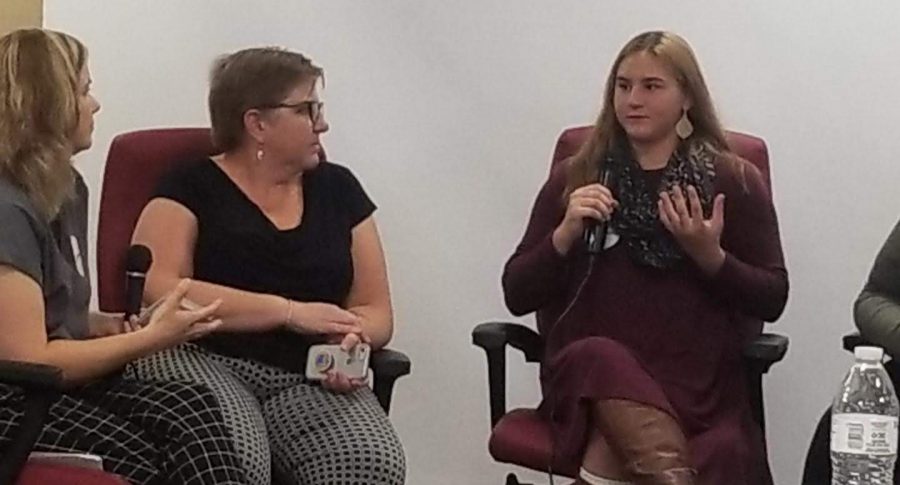Student Speaks up for Mental Health
“The panel discussions I definitely take a lot of pride in,” Drennon said.” After a lot of the events, when it’s all over, people come up to me and they want to hug me, they want to thank me for giving them inspiration, keeping them motivated and just helping them get through their situations, and it’s always really gratifying to know that even in the small community we’re in of Warren County, people recognize everything that’s going on, and they’re thankful; that it really helps.” (Photo Courtesy of Elise Drennon)
Senior Elise Drennon is a youth mental health advocate who draws from her own experience with mental illness to help others who are struggling and end the stigma surrounding it.
She works with the National Alliance on Mental Illness (NAMI) and Tri-County Care Management Organization (CMO) to share her experience at various events centered around mental health topics.
Like with many people who deal with mental illness, Drennon’s first surfaced in middle school. This is a difficult period of time for everyone, with the confusion of puberty and the pressures of school, which she said were a factor. But the real problem began when she developed intense anxiety surrounding fire alarms.
“I had one really bad panic attack in class and I had to stay after school. I remember the nurse coming down and saying, ‘Your heart rate is…it is pounding,’” Drennon said.
Drennon’s mother said that the situation escalated quickly and unexpectedly.
“There was no in between. It wasn’t gradual. It seemed like: we had it under control, we had it under control, [to]: we have no control,” she said.
Drennon said she next developed depression, OCD and began to experience suicidal ideation. She was taken out of school to go into individualized outpatient programs, partial hospitalization programs and a brief stay at Carrier Clinic Inpatient Clinic at her lowest point.
“But from there I was able to work myself up to exposing myself to triggering situations, and I was able to find different coping skills that worked for me,” she said.
Drennon said she is grateful to the clinicians who helped her so much and showed her how empathetic she truly is, prompting her to choose a career path in the mental health field.
Drennon returned to school for her entire junior year and maintained a steady grasp on her mental health. She also received straight As the entire year.
Drennon said that using techniques she had learned to maintain her current strong mental and emotional awareness coupled with stable medication has allowed her to flourish as a speaker, touching on subjects such as stigma and suicide.
Her youth advocacy stems from a deeply personal place.
“The passion to talk about mental health comes at a young age because that’s when mental illness is most prominent,” she said. “The first panel I did, I talked about how noticing what we say and how we talk about the stereotypes or the stigma surrounding the two topics is really detrimental. So it’s all about changing your perspective on both of the issues and the matters at hand.”
Drennon said when she feels anxiety creeping up before a panel she goes back to her mindfulness techniques.
“‘Why am I doing this panel?’ Because I was chosen. ‘What was I chosen for?’ I was chosen because I have a gift, or so people say, that they want me to spread,” she said.
Drennon cites her mother as being her number one supporter with such a strong mother-daughter bond.
“What I’m most proud of is that she survived,” said Mrs. Drennon.
Mrs. Drennon also admires her daughter’s eloquence and honesty when speaking and her drive to help others.
“There’s no point in sugarcoating it,” she said. “If somebody else is going to see it and use the information to help themselves, why not share those ugly moments that we usually try to hide from.”
With an intended major in Psychology at Montclair University, Drennon plans to continue her work with NAMI and hopes to be a community outreach coordinator in order to keep helping youth.
Drennon has learned much about staying positive and how to cope throughout her journey.
“Pain is temporary,” she said. “I didn’t even picture myself graduating high school when I was going through everything I was going through.”
To those going through similar struggles or who know of someone struggling, Drennon’s advice is simple, yet profound:
“Try and find that silver lining. If having ice cream for breakfast makes you happy, go ahead and do it,” she said. “It might not be the best for your diet but just trying to find those little quirks that get you excited to move on with your day and continue to be productive, is the best thing you can do for yourself.”






